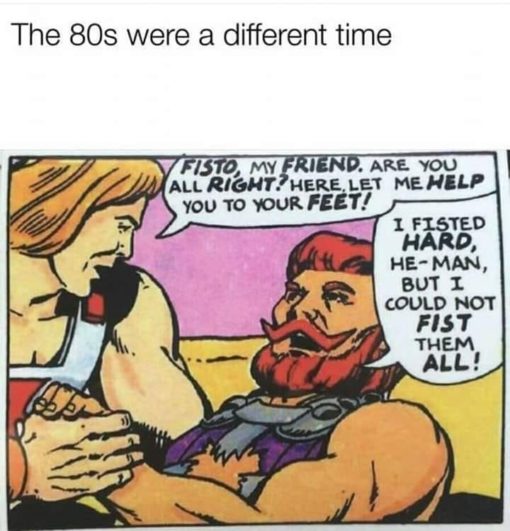The 80s were a different time FISTO MY FRIEND ARE YOU ALL RIGHT HERE LET ME HELP YOU TO YOUR FEET I FISTED HARD HE MAN BUT I COULD NOT FIST THEM ALL
The image presented is a panel from a comic book, presumably from the 1980s, showing two muscular characters in the midst of a conversation. The scene is saturated with the bright, bold colors typical of the era's comic books, with text bubbles capturing their dialogue. The artwork features the exaggerated anatomy and dynamic style prevalent in superhero comics of the time.
One character, with a prominent red beard and wearing a purple vest that reveals his broad chest, is lying on the ground. His expression is a mix of exhaustion and determination. The other character, who seems to be helping him up, is dressed in what appears to be a tan uniform, with a sleeveless top that showcases his own muscular build. His hairstyle and demeanor suggest that he is a heroic figure, concerned for his comrade.
Above the image, there's a caption that states, "The 80s were a different time," which suggests a playful nod to the distinctive culture and sensibilities of that decade. This sets the stage for the humor derived from the dialogue and context provided by the comic book panel.
The dialogue in the text bubbles reads as a somewhat innocent interaction at first glance, which nevertheless becomes humorous when applying a modern perspective. One character, addressing the other as "Fisto," inquires about his well-being and offers to help him to his feet. The humor arises from the response given by the character known as Fisto, which reads, "I fisted hard, He-Man, but I could not fist them all!"
The name "Fisto," combined with the verb "fisted," unintentionally evokes a double entendre to contemporary audiences. The original intent was likely a straightforward description of the character's valiant effort in combat, but the phrasing resonates differently in modern slang, lending the dialogue an unintentional comedic twist.
The humor in this image is amplified by the cultural shift in language and social awareness from the 1980s to the present. Phrases and words that were once innocuous can, over time, take on new meanings or connotations. Thus, modern audiences find levity in the juxtaposition of the dated, earnest dialogue with today's more nuanced understanding of language, resulting in a mix of nostalgia and playful misinterpretation. The 80s were a different time FISTO MY FRIEND ARE YOU ALL RIGHT HERE LET ME HELP YOU TO YOUR FEET I FISTED HARD HE MAN BUT I COULD NOT FIST THEM ALL
